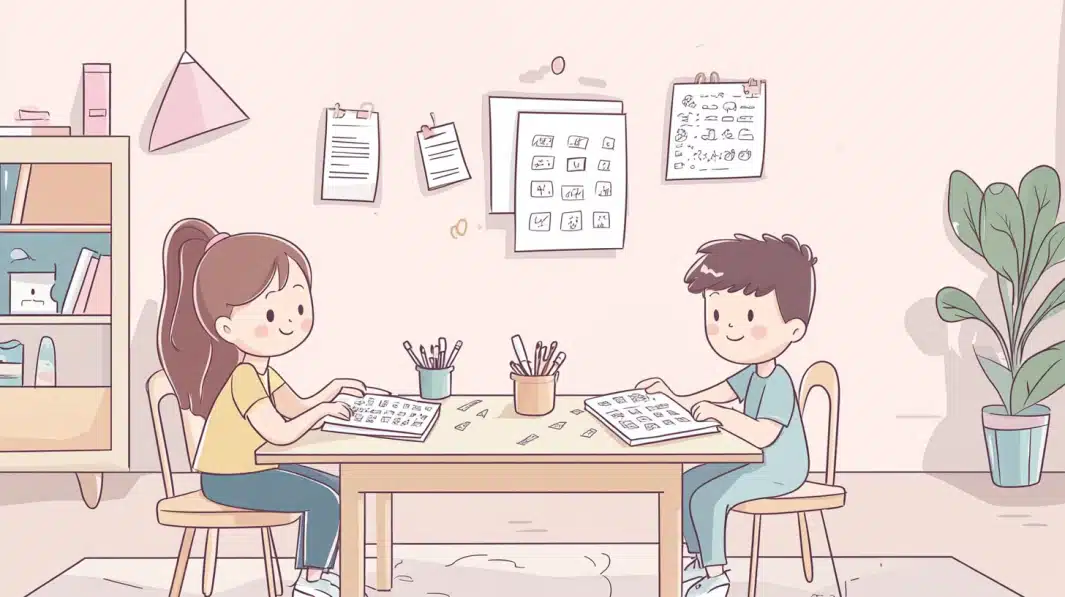Do you love playing with words? We bet you do! But sometimes, finding fresh ways to enjoy language can be tricky. Don’t worry – we’ve got you covered. Word association games are a great way to spark creativity and have fun with friends.
These games can boost your vocabulary, improve your thinking skills, and provide hours of entertainment. In this post, we’ll share 19 exciting word games that will keep you on your toes.
From quick-fire rounds to brain-teasing challenges, there’s something for everyone. Ready to dive into a world of wordplay?
Let’s explore these games together and find your new favorite way to play with language!
19 Fun Word Association Games
1. Word Association Circle

This classic game is a fun and fast-paced activity in which players stand in a circle and take turns saying a word related to the previous word. It encourages creativity and quick thinking while enhancing vocabulary skills.
How To Play
- Form a circle with the players.
- One player starts by saying a word (e.g., “apple”).
- The next player must say a related word within 5 seconds.
- Continue around the circle; players are eliminated if they can’t think of a word.
2. Word Association Gameshow

This competitive game splits players into teams where each team member must say a word associated with a given category. It’s a great team-based game that helps improve vocabulary in a fun and engaging way.
How To Play
- Divide players into teams.
- Choose one player from each team to come forward.
- Announce a category (e.g., fruits).
- Players take turns naming items in the category within 5 seconds.
- The player who cannot name a word or repeat a word is out.
3. Taboo

In this game, one player provides clues about a target word without using specific “taboo” words while the rest of the players guess the word. It helps sharpen descriptive skills and vocabulary.
How To Play
- Choose a target word and a list of forbidden “taboo” words.
- One player gives clues about the target word without saying the taboo words.
- The other players guess the word based on the clues.
- Whoever guesses the word correctly gets a point.
4. Word Association Point Scoring

This game involves teams competing to match words associated with a given target word. It encourages teamwork and expands word associations in a playful format.
How To Play
- Create cards with a target word and four related words.
- A team selects a card and reads the target word aloud.
- The opposing team guesses words they think are associated.
- Points are awarded for every correct match; the team with the most points wins.
5. Things That Go Together Game

This game involves finding pairs of objects or words that naturally go together. It’s a simple, engaging way to test vocabulary knowledge and association skills.
How To Play
- Create cards or print pictures of objects that belong together (e.g., bat and ball, shoes and socks).
- Lay out the cards or pictures in front of the players.
- Players must match the pairs as quickly as possible.
- The player with the most correct matches wins.
6. Word Association Sentences

Players must create sentences using a set of associated words. This game encourages creativity and helps build stronger sentence structures while reinforcing vocabulary.
How To Play
- Create a set of 3-4 associated words (e.g., “cow,” “milk,” “white”).
- One player must construct a sentence that uses all the given words.
- The rest of the players guess the target word based on the sentence.
- Points are awarded to the player who guesses correctly.
7. Guess Your Partner’s Word Association

In this game, players try to predict the words their partner will associate with a given word. It’s a fun way to strengthen teamwork and quick thinking.
How To Play
- Pair up the players.
- Provide each player with a word or picture.
- Each player writes down words they associate with the given word.
- Partners try to guess what words their teammates wrote.
- The pair with the most correct guesses wins.
8. Word Association Chain

Players take turns adding adjectives or nouns to a chain of words, creating a growing sentence. This game improves memory and language skills as players must remember the entire word chain.
How To Play
- Start with a noun (e.g., “tiger”).
- The first player adds an adjective (e.g., “fast tiger”).
- The next player adds another adjective and repeats the chain (e.g., “white fast tiger”).
- Continue until a player can’t add a word or forgets the chain.
9. Family Feud (Word Association Edition)

Inspired by the popular game show, this version has teams matching responses to a word association category. It’s a lively and competitive game that is great for classroom activities.
How To Play
- Split players into teams.
- Give a category (e.g., colors).
- Players take turns naming words associated with the category.
- Points are awarded based on how many players can match the top associated words.
- The team with the most points wins.
10. Tribond Questions

In this game, players are given three words, and they must find the word that connects them. It helps with lateral thinking and strengthens the ability to see connections between seemingly unrelated things.
How To Play
- Present three words (e.g., “sail,” “saw,” “gold”).
- Players must find the word that links them (e.g., they are all types of fish).
- Award points to players or teams who find the connection.
- The game continues with new sets of words.
11. Alternate Animal Names Matching

In this game, players match animals with their fun, creative names. It’s a hilarious and educational way to learn alternative animal names, such as calling a camel a “bumpy hot moose.”
How To Play
- Create cards with animals and their alternate names (e.g., camel = bumpy hot moose).
- Players must match the animal with the correct alternate name.
- The player with the most correct matches wins.
12. Onomatopoeia Game

This game matches words with sounds, such as “squeak” for a mouse or “creak” for a door. It’s a playful way to teach vocabulary related to sounds.
How To Play
- Create cards with words and their corresponding sound effects.
- Players must match the word with its sound (e.g., a door goes “creak”).
- The player who makes the most correct matches wins.
13. Word Chain

In this game, players take turns saying a word that begins with the last letter of the previous word. It’s a fun test of quick thinking and vocabulary knowledge.
How To Play
- Start with a word (e.g., “apple”).
- The next player must say a word that begins with the last letter (e.g., “elephant”).
- Continue until a player cannot think of a word or repeats one.
- The last remaining player wins.
14. Word Web

This game involves building a web of related words based on a central word. It’s a great visual activity for reinforcing vocabulary and associations.
How To Play
- Write a central word on the board (e.g., “water”).
- Players take turns adding related words (e.g., “ocean,” “rain”).
- Continue until there are no more related words.
- The player who contributes the most associations wins.
15. Rapid Fire

In this game, players have a set amount of time to name as many words as they can related to a specific category. It’s a fast-paced and fun way to test vocabulary recall.
How To Play
- Choose a category (e.g., fruits).
- Set a timer for one minute.
- Players take turns naming words in the category without repeating them.
- The player who names the most words within the time limit wins.
16. Story Circle

This collaborative game involves players taking turns adding a sentence to a growing story. It encourages creativity, teamwork, and quick thinking.
How To Play
- One player starts a story with a sentence (e.g., “Once upon a time, a dragon lived in a cave”).
- The next player adds to the story with another sentence.
- Continue until all players have contributed.
- The game ends with a completed story.
17. Hot Potato Word Association

Players pass an object around while music plays. When the music stops, the holder must say a word related to a chosen theme. It’s a lively and engaging game for all ages.
How To Play
- Choose a theme (e.g., animals).
- Play music while players pass a small object around.
- When the music stops, the player holding the object must say a word related to the theme.
- Continue until only one player remains.
18. Synonym Match

This game involves matching words with their synonyms. It’s an effective way to expand vocabulary and improve word association skills.
How To Play
- Create cards with words and their synonyms (e.g., “big” and “large”).
- Lay the cards out on the table.
- Players must match each word with its correct synonym.
- The player with the most correct matches wins.
19. Rhyming Words

Players take turns saying words that rhyme with a given word. It’s a simple yet challenging way to test creativity and quick thinking.
How To Play
- Start with a word (e.g., “cat”).
- The next player must say a word that rhymes (e.g., “bat”).
- Continue until a player cannot think of a rhyming word.
- The last player remaining wins.
Conclusion
Let’s wrap up our word game adventure! We’ve explored 19 fun ways to play with language, each offering a unique twist on word associations.
These games aren’t just about having a good time – they’re also great for sharpening your mind and expanding your vocabulary. Whether you’re looking for a quick mental warm-up or a fun party game, there’s something here for everyone.
Why not give a few of these games a try? You might find a new favorite or rediscover the joy of wordplay. Remember, the key is to have fun and let your creativity flow.
So gather your friends or family, or even play solo, and start your word association journey today. Who knows what clever connections you’ll make?




